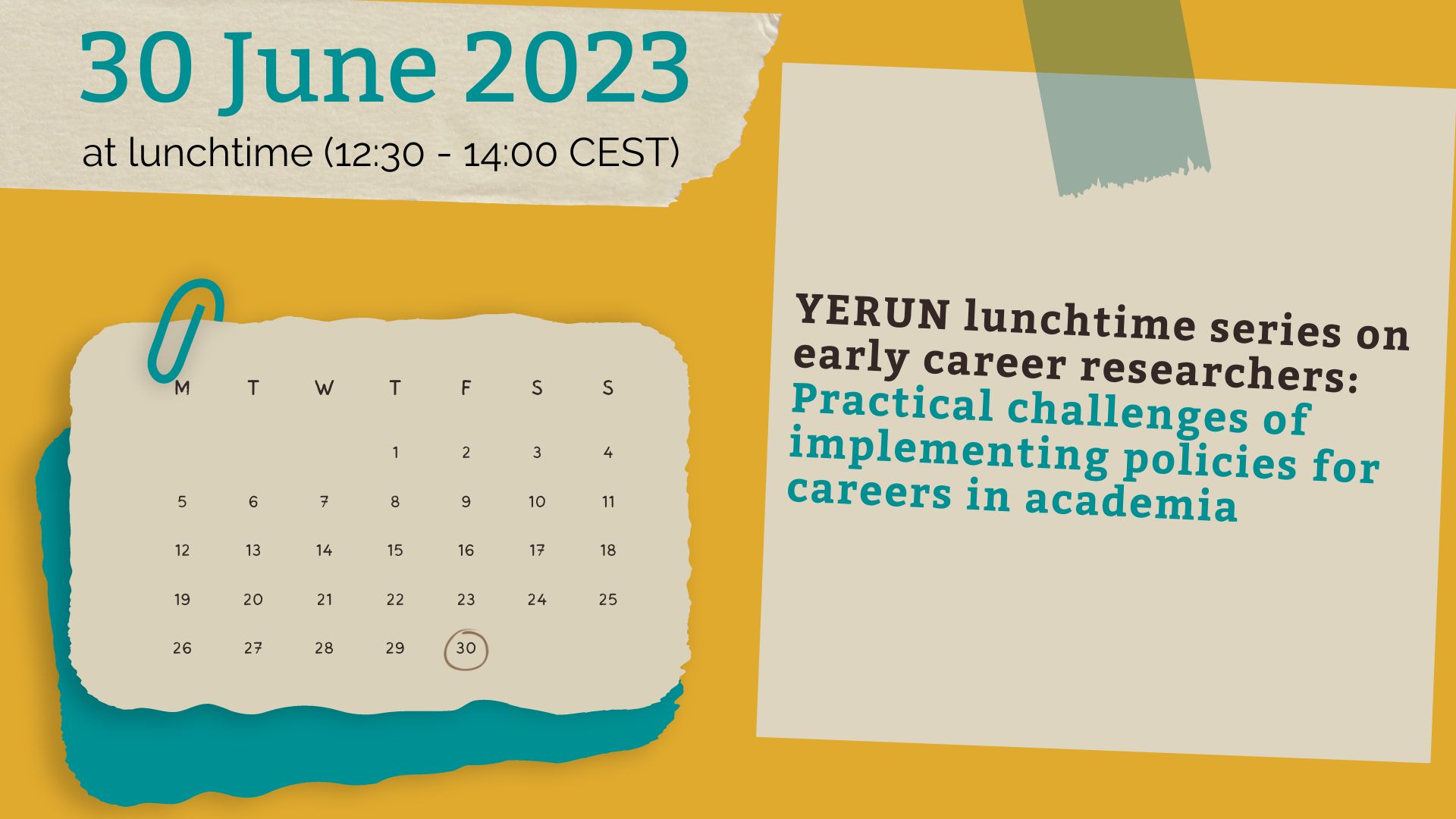In the context of its extensive work on ERA Action 4 (Research Careers) and related initiatives, as well as on ERA Action 3 (Reform of Research Assessment) and within CoARA, YERUN has organised a series of lunchtime events in June, dedicated to Early Career Researchers (ECRs).
The fourth and final event in the series took place on 30 June 2023. It focused on implementation: the concrete steps taken by universities and other academic institutions to make policies a reality. It took the form of a closed roundtable between policy-makers and policy-implementers, engaging in constructive discussions to identify challenges and solutions to issues relating to the implementation of policies for careers in academia.
Featured participants included key officials designing policy for research and academic careers at the European Commission (from both DG RTD and DG EAC), as well as stakeholder representatives, HR directors, heads of Doctoral Schools and relevant experts from CESAER, the Coimbra Group, the EUA, EU Life, LERU, The Guild and, of course, YERUN.
Here is a snapshot of the event, reflecting YERUN’s take on the debates:
Discussions touched on the multifaceted and multilevel challenges universities tackle when implementing policy for research and academic careers:
- At system level, universities and other academic institutions operate in a context where European, national, regional and institutional authorities and their different departments (for higher education, research and employment, notably) produce career-focused or career-relevant policies and legislation which overlap with and sometimes contradict one another. Navigating the complexity of the legal and policy landscape requires in itself time and resources from universities.
- The complexity of the policy landscape is itself compounded by the funding landscape, which comes with opportunities, but also additional constraints. Thus, the options available to employers when designing and implementing strategies for academic careers are also shaped by a multiplicity of conditions attached to funding, whose push and pull may curtail institutional autonomy beyond necessary.
- In light of the above, coordination efforts to ensure new policies and strategies at different levels make sense with one another are both welcome and needed. At the same time, the very added value of launching new initiatives and the instruments chosen to carry them forward should be carefully weighed since their inception through structured exchanges with stakeholders.
- Moreover, different levels of implementation come with their own challenges. While the roundtable discussions were too rich to provide an exhaustive summary in this Snapshot, a recurring theme was the need to find a better balance between sometimes conflicting imperatives, including through a reworking of legislation and/or incentive structures:
- Finding a better balance between fostering vitality in research, on the one hand, which may justify to an extent fixed-term, project-based contracts; and promoting the stability and attractiveness of contract and overall working conditions in academia, on the other hand, which relies on sustainable funding.
- Finding a better balance between the requirements of project-based research, on the one hand, where researchers working under PIs are incentivised to develop a highly specialised research profile; and, on the other hand, the need to prepare these researchers for flexible career paths through more general training and career development initiatives, on the other hand.
- Finding a better balance in the concrete allocation of tasks between academics, allowing diverse professional profiles to be developed and evolve over time, repositioning research as one of the activities performed in universities alongside teaching, knowledge valorisation, engagement and leadership.
Making progress on these and other objectives will require coordinated and coherent action at different implementation levels, in which all relevant actors should have a voice. In this regard, universities and academic institutions are moving forward with interesting initiatives and solutions. Some of them rely unambiguously on the extent of resources available, stressing again the need for authorities to support key positions such as research managers, knowledge valorisation offices, and ensure generally that universities and other academic institutions can hire the staff they need. Some of the solutions consist in innovative organisational structures, placing doctoral schools and other bodies at the intersection of different departmental initiatives. Myriad other solutions are implemented every day, through targeted as well as institution-wide interventions.
Sustained engagement on implementation initiatives and challenges with policy-makers appears as a precondition for the success of our shared ambitions. At the same time, dialogue with other universities and stakeholders allows us all to share both concerns and innovative practices. YERUN will keep promoting exchanges within the sector on issues of policy implementation for careers in academia.










